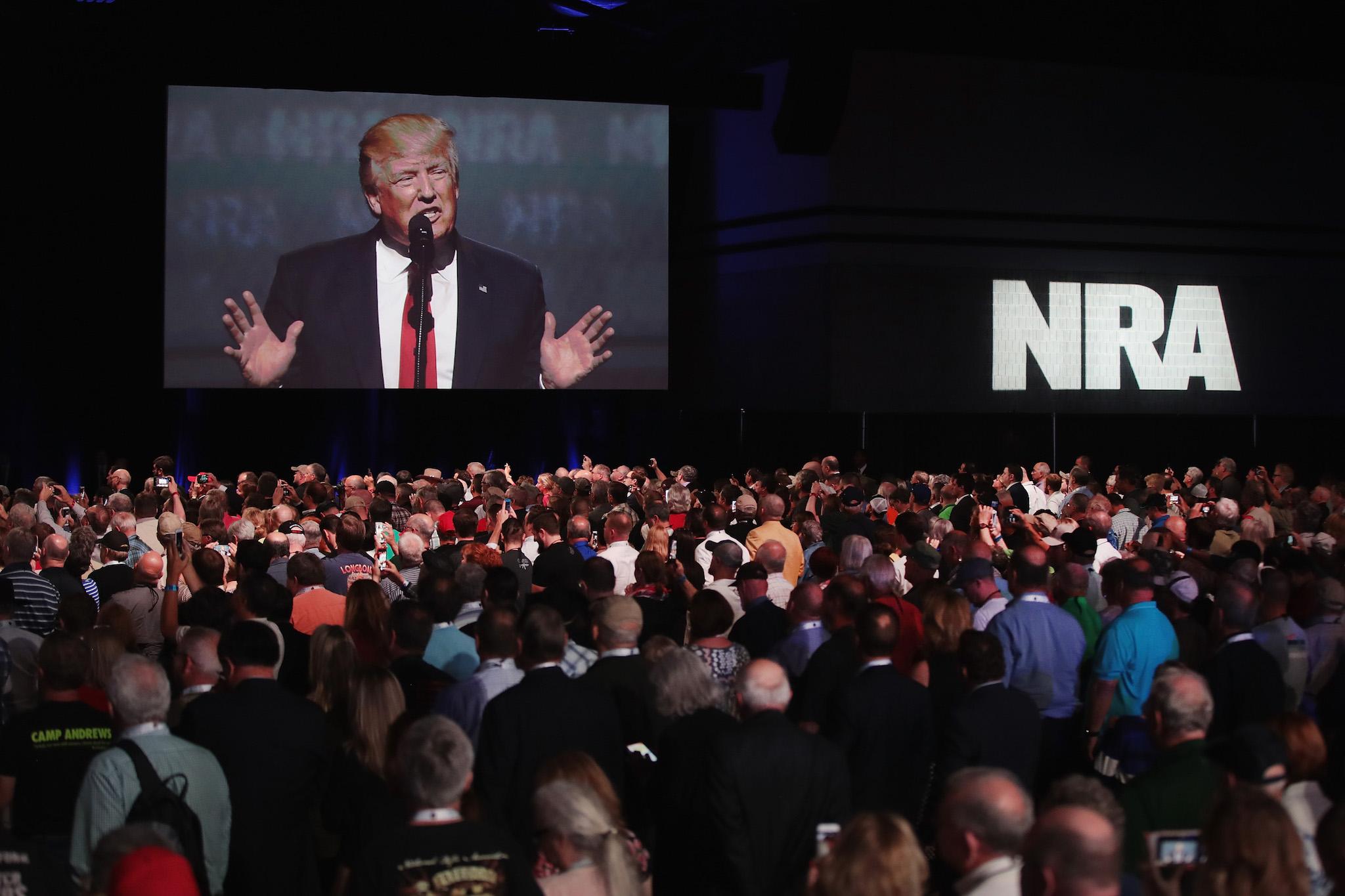Las Vegas shooting: How the NRA has influenced the White House over the last 30 years
The gun advocacy group has been a key player in the debate over gun ownership laws

Your support helps us to tell the story
From reproductive rights to climate change to Big Tech, The Independent is on the ground when the story is developing. Whether it's investigating the financials of Elon Musk's pro-Trump PAC or producing our latest documentary, 'The A Word', which shines a light on the American women fighting for reproductive rights, we know how important it is to parse out the facts from the messaging.
At such a critical moment in US history, we need reporters on the ground. Your donation allows us to keep sending journalists to speak to both sides of the story.
The Independent is trusted by Americans across the entire political spectrum. And unlike many other quality news outlets, we choose not to lock Americans out of our reporting and analysis with paywalls. We believe quality journalism should be available to everyone, paid for by those who can afford it.
Your support makes all the difference.While Donald Trump received the most gun lobby funding of any presidential candidate ever, the association between the White House and gun advocates goes further back.
The state of the alliance has centred on the gun control versus gun rights debate, which focuses on an individual’s right to bear arms and the government’s obligation to counter violence and crime.
The mass shooting in Las Vegas has reignited the controversy over gun ownership laws, which first galvanised several gun rights activists – primarily members of the National Rifle Association (NRA) – in 1968 after the passage of the Gun Control Act (GCA).
This act prohibited the sale of guns to convicted felons, drug users and the mentally ill, and also required firearm dealers to obtain licenses and imposed interstate sale restrictions. The law also increased the age to legally purchase a handgun to 21.
In 1975, the NRA established its lobbying arm, the Institute for Legislative Action, which aimed to nullify the 1968 law.
President Ronald Reagan, an NRA member, signed the Firearm Owners’ Protection Act in 1986, easing some of the penalties of the GCA and banning a federal registry of gun owners.
Gun culture evolved in 1981 after John Hinckley Jr tried to assassinate Mr Reagan but instead nearly killed the President’s press secretary, James Brady. Mr Brady and his wife Sarah then became activists.
“You can begin to see a sea change of attitudes during this time,” said Sarah Brady, according to MSNBC. “The NRA was fighting against the cop-killing bullets and plastic guns, and we got into an alliance with law enforcement and we just got together and said, ‘What’s the first thing we should do?’ And we all said, ‘Background checks.’”
In 1991, Mr Reagan said at a ceremony at George Washington University: “I want to tell all of you here today something that I’m not sure you know. You do know that I’m a member of the NRA. My position on right to bear arms is well known. But I want you to know something else. And I’m going to say it in clear unmistakable language. I support the Brady bill and I urge the Congress to enact it.”
President Bill Clinton signed the Brady Handgun Violence Prevention Act into law in 1993, creating a system of federal background checks for purchases from federally licensed gun dealers.
During the Clinton administration, the White House’s relationship with the NRA became contentious, with Mr Clinton working to curb the power and influence of the association. In 1994, he signed into law a crime bill that included a ban on assault weapons.
But gun-control advocates paid a heavy political price for Mr Clinton's efforts: The NRA mobilised its members, which tend to be more politically active than supporters of gun control, according to the Washington Post. In 1994, the Republicans reclaimed the House of Representatives for the first time in 40 years, with the issue of gun control further dividing Democrats and Republicans.
In 2004, President George W Bush, who was never a member of the NRA, said: “I did think we ought to extend the assault weapons ban, and was told the fact that the bill was never going to move, because Republicans and Democrats were against the assault weapon ban, people of both parties. I believe law-abiding citizens ought to be able to own a gun. I believe in background checks at gun shows or anywhere to make sure that guns don’t get in the hands of people that shouldn’t have them.”
About 11 years before, his father, former President George HW Bush, wrote a letter to the NRA two weeks after the Oklahoma City bombing, resigning as a life member of the association.
No Republican president appears to have been as NRA-friendly as Mr Trump.
In April, Mr Trump declared to members of the NRA: “The eight-year assault on your Second Amendment freedoms has come to a crashing end.”
He also assured association – which had donated more than $30m to his presidential campaign – that it now has “a true friend and champion in the White House.”
His comments came after he signed a resolution in February blocking an Obama-era rule that would have prevented an estimated 75,000 people with mental disorders from buying guns.
The rule was part of former President Barack Obama's push to strengthen the federal background check system following the 2012 Newtown, Connecticut shooting – the deadliest school shooting in US history.
Join our commenting forum
Join thought-provoking conversations, follow other Independent readers and see their replies
Comments